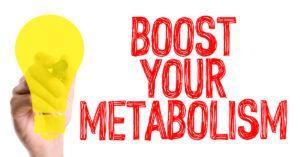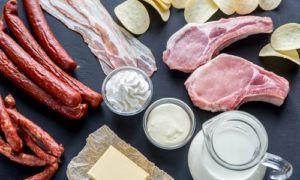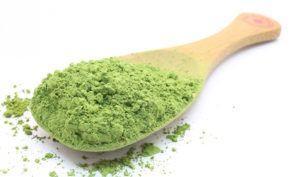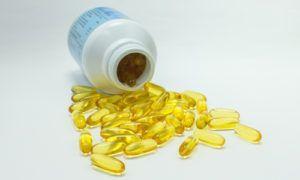 One of the most effective ways to burn fat and calories to obtain our ideal body weight is to boost our metabolism.
One of the most effective ways to burn fat and calories to obtain our ideal body weight is to boost our metabolism.
This is the process by which the body breaks downs the foods and beverages that we consume into useable energy, and waste.
Both parts of the process are important to ensure that our body burns the calories we eat, and we don’t end up with excess waste or toxins in the body that can cause a disruption in our weight loss process.
In scientific terms these two processes are called:
Catabolism – the breakdown of food molecules to obtain energy from them.
Anabolism – the synthesis of those molecules to access energy in usable forms for the body’s cells.
Our body metabolizes fats, proteins (amino acids), minerals, vitamins, carbohydrates, and sugars. The proper enzymes are also needed to ensure this process happens as smoothly as possible, and can signal other cells to do what they need to do to metabolize our food.
There are also three different mechanisms which are helpful to understand when you want to learn how to boost your metabolism:
- The Resting Metabolic Rate (RMR) – the amount of energy we require to maintain bodily functions and processes when we are resting and awake. The RMR comprises about 60% of our total daily caloric needs.
- The Thermic Effect of Feeding (TEF) – the number of calories we use to eat and digest food which makes up about 5-10% of our total caloric needs.
- The Thermic Effect of Activity (TEA) – the rate at which we burn calories while exercising or just moving. This accounts for about 30% of our caloric needs.
As you may have surmised, we can burn calories while we are moving, sitting, eating, or even sleeping.
Each of these can be positively supported to burn more calories so that our metabolism is in high gear even while we dream at night.
Following are 15 things we can do to help support the bio-chemical process of metabolism (burning fat!)
1. Exercise

When we are young, our bodies metabolize the foods we eat very easily. As we age, the process of metabolism can slow down. Whether our metabolism is speedy or sluggish due to age, genes, our sex (women naturally have slower metabolisms than men) there is one thing that evens the playing field – exercise.
By working out we can increase muscle mass that starts to decline as we get older, causing us to burn fewer calories. When we weight train, run, hike, swim, bike, or engage in any other physical activity our metabolism is boosted in different ways.
For example, aerobic activity like a cardiovascular work out will boost our caloric burn while we are doing the activity, but won’t increase the burn throughout the day.
Increasing our muscle mass through weight training burns fewer calories while we are doing the exercise, but then our metabolism is boosted even while we aren’t working out.
The best way to get a boost metabolically is to do both. Add strength training two times a week, and at least 60 minutes of cardiovascular activity where it is difficult to maintain a conversation while performing the exercise (biking, dancing, swimming, etc.) at least three times a week.
2. Afterburn
In short, afterburn is the number of calories your body can burn after your workout is done. That’s right, you burn calories even after you’ve stopped stair climbing or an aerobics class. As a general rule, the more intense the exercise is, the more significant the afterburn will be.
A simple example is this: If you were to run as fast as you can for 30 seconds in five intervals, you will burn many more calories than if you just jogged at a moderate pace for 30 minutes.
Add intensity to your workouts to get a huge metabolic boost even when you are resting later on in the day.
3. Get rid of trans fats

Did you know that trans fats (trans fatty acids) can make you fatter than other foods you eat with the exact same number of calories?
They also cause insulin resistance and inhibit our ability to burn fat. Researchers at Wake Forest University found that trans fats also increase the amount of fat we store in our belly and midsection.
Our body does not metabolize trans fats the way it does a natural fat which comes from an avocado or an olive, because they have been highly processed. Avoid them in order to keep your metabolism high.
4. Eat breakfast like a king, lunch like a prince, and dinner like a pauper
It stands to reason that as the day progresses, our caloric needs grow smaller, too. In both ancient Ayurvedic and Chinese medicine, it is taught that we should eat the largest meal of the day first, and eat progressively smaller amounts as the day turns to night.
This ensures that our body can attend to other important tasks besides metabolizing (digesting) our food when we sleep at night.
Thousands of different repairs and ‘housecleaning’ happens in the body while we are resting, but if we eat a big dinner, our organs have to focus on digestion instead of cleaning house.
Eat big at breakfast, and small at dinner to ensure all the metabolic processes we need to transpire can do so efficiently.
Another variation to this teaching is to eat many small meals throughout the day to boost metabolism, which also will ensure that you aren’t eating a massive meal at night, that your body then has to assimilate.
5. Utilize catechins in green tea

Green tea is notorious for boosting our metabolism, and helping to burn additional calories.
One of the bioactive compounds in green tea, an antioxidant called a catechin is full of EGCG (Epigallocatechin gallate), a substance that can boost metabolic functioning.
EGCG can help inhibit an enzyme that breaks down the hormone norepinephrine. When this happens, the nervous system is signaled to break down fats.
Add a green tea supplement or add several cups of green tea to your daily routine.
You can even sip on it while you workout!
Read: How Green Tea Can Help You Lose Weight
6. Eat more, not less, but eat right
Some people think that by starving themselves, that they can lose weight.
The only problem with this approach to weight loss is that your body will slow the metabolic process.
That means it will take more effort for the body to burn calories, so what you do eat breaks down more slowly.
The body does this as a way to protect against perceived famine and stress. Our body actually increases our metabolism when we eat, so if we skip meals or drastically cut calories, then we will have a sluggish metabolism. Instead of eating less, concentrate on eating unprocessed, low-refined sugar, whole foods like grains, legumes, fruits, vegetables, and plant-based proteins.
7. Do strength training and not just cardio
We’ve already outlined the importance of adding exercise, and higher intensity to your workouts, but the importance of strength training cannot be overlooked for boosting your metabolism.
The more muscle you have, the more calories you burn. Our muscles demand energy at rest, our fat cells do not.
Boost your metabolic burn by strength-training several times a week for at least 30 minutes.
8. Increase your fish oil intake

Omega 3s help torch calories.
Adding a fish oil supplement, or increasing your Omega 3 intake from other foods high in this source of fatty acids can help you burn an extra 200 calories a day.
Omega 3s naturally support the metabolic process. Mackerel, and cod liver are good sources.
Flaxseeds, radish seeds and chia are also high in Omega 3s if you want plant-based sources of this important nutrient.
9. Boost the intensity of your workouts, not the duration
‘More’ and ‘longer’ isn’t always better.
Many people think that they have to run a marathon or spend endless hours on the elliptical in order to burn enough calories.
High intensity interval training (also known as HIIT) can save you time, and boost calories simultaneously.
Most HIIT workouts can be done in 30 minutes or less.
There are thousands of Youtube videos that can guide you through this quick, and efficient workout style.
You can start with a ten minute HIIT workout, and increase the duration to 30 minutes as your fitness level improves.
10. Eat foods that burn calories
There are many foods known for being fast burners.
Whole foods are best. It takes your body twice as many calories to break them down.
This includes things like whole grains, oatmeal, lean proteins, low-fat dairy (which is high in Vitamin D which supports a healthy metabolism, too), lentils and beans which are high in fiber, and vegetables that have a high water and fiber content like cucumbers or celery.
11. Eat organic to protect your thyroid

The thyroid is in charge of many important functions in your body, from helping to regulate sleep/wake cycles, to supporting your endocrine and hormonal secretions, which in turn control your hunger.
Many studies have proven that genetically modified, pesticide laden foods alter our endocrine system.
Eat organic whenever you can to protect this important gland and support a healthy metabolism.
12. Eat more plant proteins
All types of proteins will help keep you full and boost your metabolism but animal-based proteins can also cause your body to become overly acidic.
Though many plant proteins lack an amino acid which is available in meat, they are assimilated more easily by the body, causing less toxins and metabolic waste.
13. Spend time in nature
We are much more likely to be active when we spend time outside, but there is also proof that just chilling out on the beach or taking a walk in a wooded park helps to regulate our hormones, responsible for a number of our metabolic processes.
One of the most important things spending time in nature does is reduce our levels of Cortisol, a stress hormones known for making us overeat.
14. Incorporate more activity in your every-day life
One of the easiest ways to boost your metabolism is to just move more.
Things like walking a longer distance in the parking lot to the grocery store by parking further away, cleaning the house, or lifting heavy things can help to increase the number of calories you burn.
15. Stay Positive
Happiness gives us energy. Energy allows us activity. Activity burns calories!
There’s also evidence that fit people are happier and happier people are fit.
Read:-
- 5 Best Exercise to Lose Weight Faster
- 25 Best Foods to Eat For Faster Weight Loss

